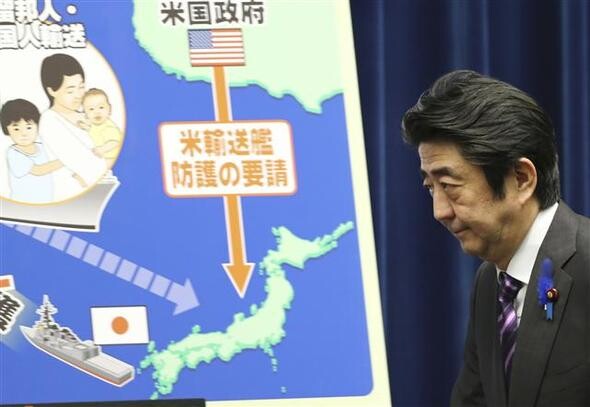hankyoreh
Links to other country sites 다른 나라 사이트 링크
[Editorial] Japan becomes a country that can wage war

The cabinet of Shinzo Abe at last pulled the gun that it has been carrying around but not using all this time. It reversed the security policy that Japan had maintained since losing World War II, switching from a country that cannot wage war to a country that can.
With the addition of Japan’s powerful military, the various tensions and conflicts in East Asia - between the US and China, China and Japan, North and South Korea, and China and the countries of Southeast Asia - are sure to become even more complicated and dangerous.
During a meeting of the provisional cabinet on July 1, the Abe administration abandoned the official position of previous cabinets that Japan has the right to collective self-defense but that it is unable to exercise this right because it conflicts with the spirit of Japan’s peace constitution. In its place, the government adopted the position that exercising the right of collective self-defense is permitted by the constitution. In effect, Abe amended the constitution by reinterpreting it.
The distribution of parliament seats, public opinion, and governing principles made it impossible to amend Article 9 of the Japanese constitution, which forbids war and the use of force. So instead, the cabinet chose the indirect method of reinterpreting the constitution.
The Abe cabinet set out three conditions for the use of armed force in exercising the right to collective self-defense. The survival of the state must be threatened by attack from the outside; there must be a clear and fundamental threat to the people’s right to life, freedom, and the pursuit of happiness; and there must be no other appropriate means of preserving these.
However, these conditions are mere show, since it’s wholly possible for them to be interpreted arbitrarily. It would be no exaggeration to say that Japan is now able to wage war wherever it pleases.
There is increasing opposition and protest even among the Japanese about the transformation of military and security policy in Japan, which carries with it such great risk. Despite this, the Abe cabinet, which takes the view that the dogs may bark, but the caravan keeps rolling, will accelerate its efforts to neutralize and neuter the peace constitution. This position is backed by the US, which is trying to induce Japan to counter the rapid rise of China.
Now that Japan’s right to collective self-defense has become a fait accompli, the South Korean government must adopt a new approach, backing up words with action. There is a decisive difference between a Japan that cannot use military force and a Japan that can.
In addition, Japan has a history of inflicting tremendous pain and suffering on its neighbors in Asia, including Korea. While for now, the Abe cabinet’s exercise of the right to collective self-defense is predicated on assisting US military forces operating in the region, this ultimately must be understand as a preparation for the possibility of US forces withdrawing from the region.
Whatever the circumstances, the response of the South Korean government must be focused on countering Japan and preventing its military from being used to aggravate regional conflict.
Please direct questions or comments to [english@hani.co.kr]

Editorial・opinion
![[Column] Has Korea, too, crossed the Rubicon on China? [Column] Has Korea, too, crossed the Rubicon on China?](https://flexible.img.hani.co.kr/flexible/normal/500/300/imgdb/original/2024/0419/9317135153409185.jpg) [Column] Has Korea, too, crossed the Rubicon on China?
[Column] Has Korea, too, crossed the Rubicon on China?![[Correspondent’s column] In Japan’s alliance with US, echoes of its past alliances with UK [Correspondent’s column] In Japan’s alliance with US, echoes of its past alliances with UK](https://flexible.img.hani.co.kr/flexible/normal/500/300/imgdb/original/2024/0419/2317135166563519.jpg) [Correspondent’s column] In Japan’s alliance with US, echoes of its past alliances with UK
[Correspondent’s column] In Japan’s alliance with US, echoes of its past alliances with UK- [Editorial] Does Yoon think the Korean public is wrong?
- [Editorial] As it bolsters its alliance with US, Japan must be accountable for past
- [Guest essay] Amending the Constitution is Yoon’s key to leaving office in public’s good graces
- [Editorial] 10 years on, lessons of Sewol tragedy must never be forgotten
- [Column] A death blow to Korea’s prosecutor politics
- [Correspondent’s column] The US and the end of Japanese pacifism
- [Guest essay] How Korea turned its trainee doctors into monsters
- [Guest essay] As someone who helped forge Seoul-Moscow ties, their status today troubles me
Most viewed articles
- 1[Column] The clock is ticking for Korea’s first lady
- 2Samsung barricades office as unionized workers strike for better conditions
- 3After 2 months of delayed, denied medical care, Koreans worry worst may be yet to come
- 4[Correspondent’s column] In Japan’s alliance with US, echoes of its past alliances with UK
- 5[Column] Has Korea, too, crossed the Rubicon on China?
- 6Hong Se-hwa, voice for tolerance whose memoir of exile touched a chord, dies at 76
- 7[Photo] Smile ambassador, you’re on camera
- 8All eyes on Xiaomi after it pulls off EV that Apple couldn’t
- 9[Guest essay] How Korea turned its trainee doctors into monsters
- 10US overtakes China as Korea’s top export market, prompting trade sanction jitters